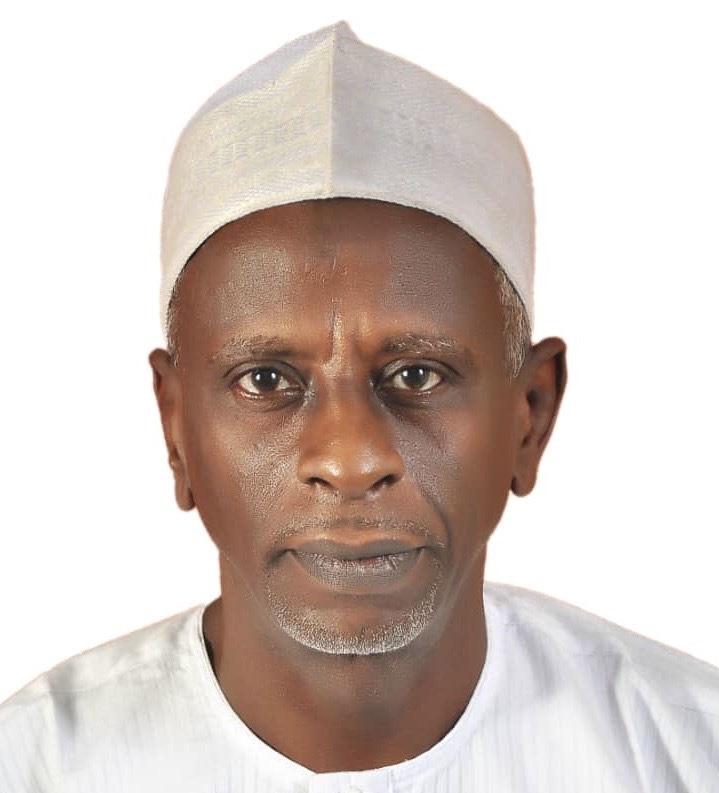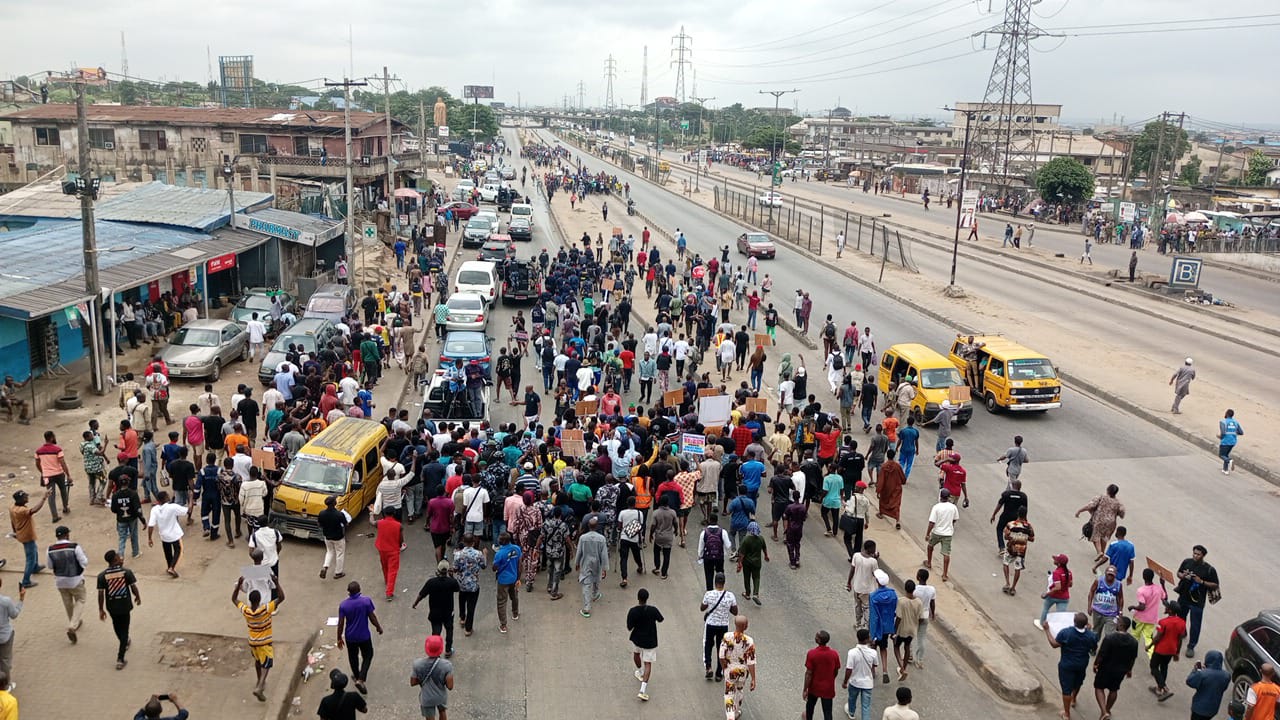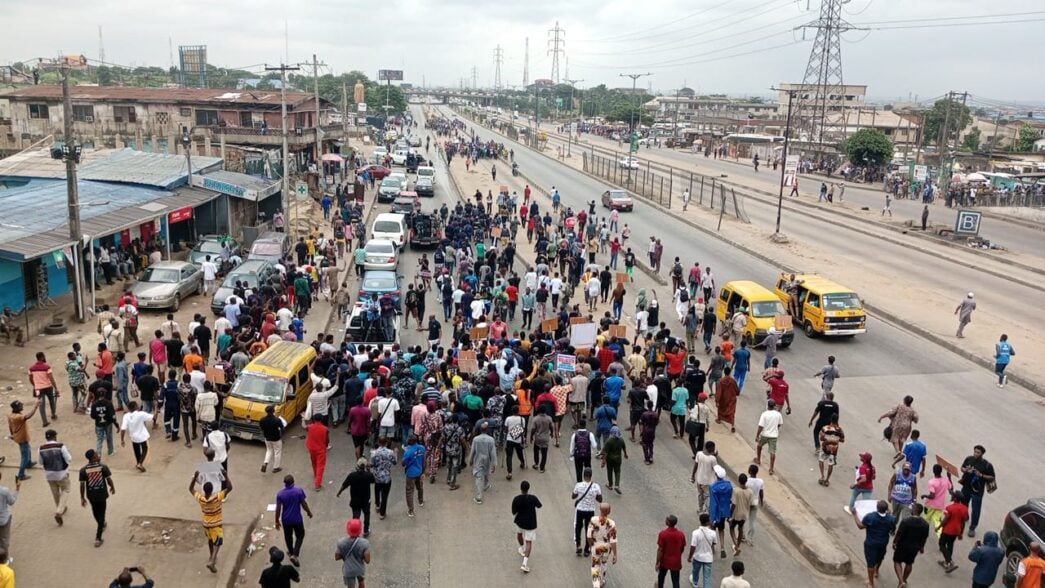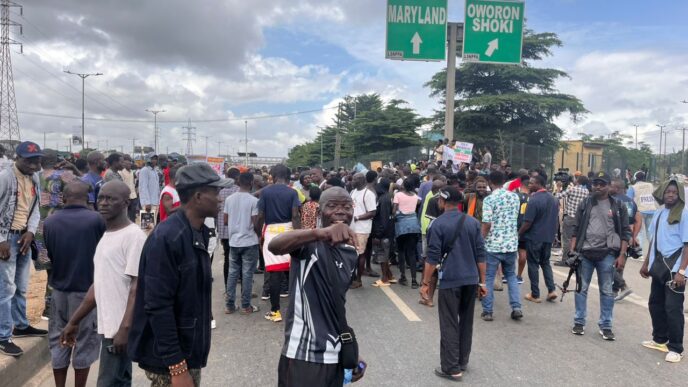As nationwide planned protests against bad governance and hunger get underway, it is possible that the worst wrath of the masses may have been inadvertently averted. For one, real revolutions are not advertised and are usually unannounced. For another, the passionate pleas and prayers of patriotic Nigerians especially religious and traditional rulers went a long way to convince most of the angry and hungry citizenry to give the governments yet another chance to right the wrongs.
The tragedy would be for the political ruling class to assume that the people are pacified by the pathetic palliatives that they have been frenetically putting out in the build-up to the protests. These measures do not indicate they even appreciate the scale of the problem. So far, the largest intervention by the Federal Government involves the distribution of 20 truckloads containing 1,200 of 25 kg bags of rice to each state.
Lagos and Kaduna States have populations estimated at 20 and 10 million respectively so that if this rice is shared to 33 per cent of the population being the most vulnerable, it translates to 100g and 200g per person respectively. This caricature of caring was captured in viral videos of anonymous persons in armoured vehicles tossing small sachets of rice at pedestrians on major roads.
Bogus headlines announcing puny placebos actually aggravate the anger in the land. For instance, a recent report captioned “President approves N50,000 monthly grant to youths,” turned out to involve just 10,000 unemployed young people in the Niger-Delta.
Advertisement
Another “First Lady Meets Governors’ wives, reels out empowerment programmes for 37,000 Nigerian women,” also disclosed that 1000 women from each state and the Federal Capital Territory will receive a one-off grant of N50,000 to grow their petty businesses and help them exit the poverty trap!
Political office-holders need to know that the issues involved would take more than tokenism to resolve. For instance, the new minimum wage of N70,000 hurriedly passed into law by the National Assembly and swiftly signed by President Bola Tinubu is nowhere near solving the biting cost-of-living crisis. The amount is still less than the price of a bag of rice. It needs to be complemented with provisions for healthcare, education, transportation and affordable power.
The purpose of minimum wages is to guarantee living remuneration and protect workers against unduly low pay. In recent years, food prices have been on the rise. Nigeria’s annual inflation rate rose to 33.69 per cent in April from 33.20 per cent in March, the National Bureau of Statistic (NBS) said in its latest inflation report. The food inflation rate in April 2024 quickened to 40.53 per cent on a year-on-year basis, 15.92 per cent points higher compared to the rate recorded in April 2023 (24.61 per cent). Due to the impact of policies in the past year such as the removal of subsidies on petroleum products and liberalisation of the exchange rate, the upward trend in the prices of food staples and other needs has made it difficult for most households in the country to afford adequate food.
Advertisement
According to the NBS, the average cost of a healthy diet (CoHD) excluding the cost of transportation and meal preparation in Nigeria went up to N1,035 in April this year. The NBS said the CoHD is the least expensive combination of locally available items that meet globally consistent food-based dietary guidelines. This means a family of only four members needs N124,200 per month just for food. It was 5.4 per cent higher than the amount recorded in the previous month and more than 40 per cent year-on-year.
There is a clear correlation between the miserable conditions of workforces, crass corruption and the abysmal services currently offered at Federal, States and Local Government Councils. Imagine the fate of the remaining population who earn their livelihoods from workers’ expenditures. The 300 per cent increase in electricity tariffs enforced by the Nigeria Electricity Regulatory Agency since May 2004 has not only exacerbated poverty but ground down essential services in hospitals and tertiary institutions. Worst of all, it threatens the survival of small and medium enterprises that are the largest employers of labour.
Similarly, some 20,000 Nigerian students may start receiving loans worth N850 billion loan from 1st August but they may each pay N80,000 in electricity fees. As the Secretary-General of the Committee of Vice-Chancellors of Nigerian Universities, Professor Yakubu Ochefu, disclosed last week the universities cannot afford the over N200 million monthly electricity charges. The University of Benin has already been disconnected from the national grid for inability to pay about N300 million monthly bills.
Today, the greatest inequality in Nigeria is between the haves and the have-nots. A national poverty average rate of over 60 per cent and above 80 per cent in some states in the north is simply insupportable. The new minimum wage of N70,000 means that the majority of workers are still living well below the poverty line. What is astonishing is the attitude of political office-holders presumably elected to deliver the proverbial dividends of democracy in terms of development.
Advertisement
The argument by the governors that even N70,000 as a minimum wage is not sustainable due to the lean financial resources of their states, competing demands and the indebtedness of many of them seem so shallow. Their threat that over 40-90 per cent of the workforce in many of them will be laid off is akin to being clever by half. Such sharp dissonance is disturbing. It is deeply distressing that the powers-that-be seem so far-removed from the reality of everyday life in the country.
Only a couple of states such as Anambra and Edo approved N70,000 minimum wage for their workers even before the conclusion of negotiations. Governor Chukwuma Soludo of Anambra State, who as a former Central Bank of Nigeria governor has a full grasp of the issues involved, in a subtle dissent at a recent public forum, said all public office-holders including politicians should be placed on the new national minimum wage for them to properly feel the pinch. It only requires the state and federal governments to fashion out good governance templates to cope with the inherent fiscal challenges. The organised private sector can also cope once the operating environment becomes more conducive.
The humongous size of the monthly federal and state government’s payroll can be tackled with the implementation of the 2012 Steven Orosanye report on right-sizing the workforce. A bureaucracy where 24 drivers may be attached to a pool of five vehicles is counterproductive. It deserves to be re-jigged for efficient service delivery.
Similarly, exorcising ghost-workers and absentee employers could result in substantial cost savings.
Advertisement
Paying Nigerian workers living wages would also be facilitated if the authorities ensure that they collect oil and gas revenues from international oil companies and other extractive industries making billions of dollars annually here. For instance, a recent audit report of the Nigeria Extractive Industry and Transparency Initiative (NIETI) shows that a staggering sum of $1.4 billion in gas royalties and flaring penalties for only 2021 remain uncollected. Similarly, some international oil companies indulge in outright crude oil theft such that $17 billion worth of crude was stolen between 2011 and 2014, according to an investigation by the National Assembly.
Nigeria loses even more on unnecessary imports. Last year, over $600 million went into the importation of palm oil, according to the President of the National Palm Produce Association of Nigeria (NPPAN). Millions more were spent to import wheat, milk and tomatoes, etc. This staggering financial drain highlights a critical challenge in the nation’s agricultural sector.
Advertisement
States can also lessen their financial burdens by aggressively weaning their payrolls of ghost workers and personnel without any work schedule, office space or even desks. Some state governors have thousands of aides even as First Ladies and Commissioners parade hundreds of advisers, aides and assistants.
Above all, an overhaul of the internally generated revenue (IGR) mechanism is necessary to ramp up the revenue base. Many states have suspect revenue accounting or returns systems that undermine their treasuries. Governor Siminalayi Fubara of Rivers State, has in the last one year in office improved the state’s IGR from N13 billion monthly to N27 billion.
Advertisement
Other financial leakages and the misplacement of priorities, typified in the recently inaugurated N21 billion official quarters of the Vice-President; the N5 billion Presidential yatch; the $12 billion annual loss of solid minerals revenue to rogue operators; and the ostentatious lifestyle of public officials are responsible for the seeming inability of government to pay workers proper wages.
Catering to citizens and workers welfare is not negotiable if government is desirous of a peaceful and patriotic citizenry and developing an effective and efficient workforce. The alternative is to continue to periodically court protests. Like a vicious circle, this is guaranteed to perpetuate poor governance, poverty and under-development at all levels.
Hassam-Tom writes from Abuja
Advertisement
Views expressed by contributors are strictly personal and not of TheCable.












